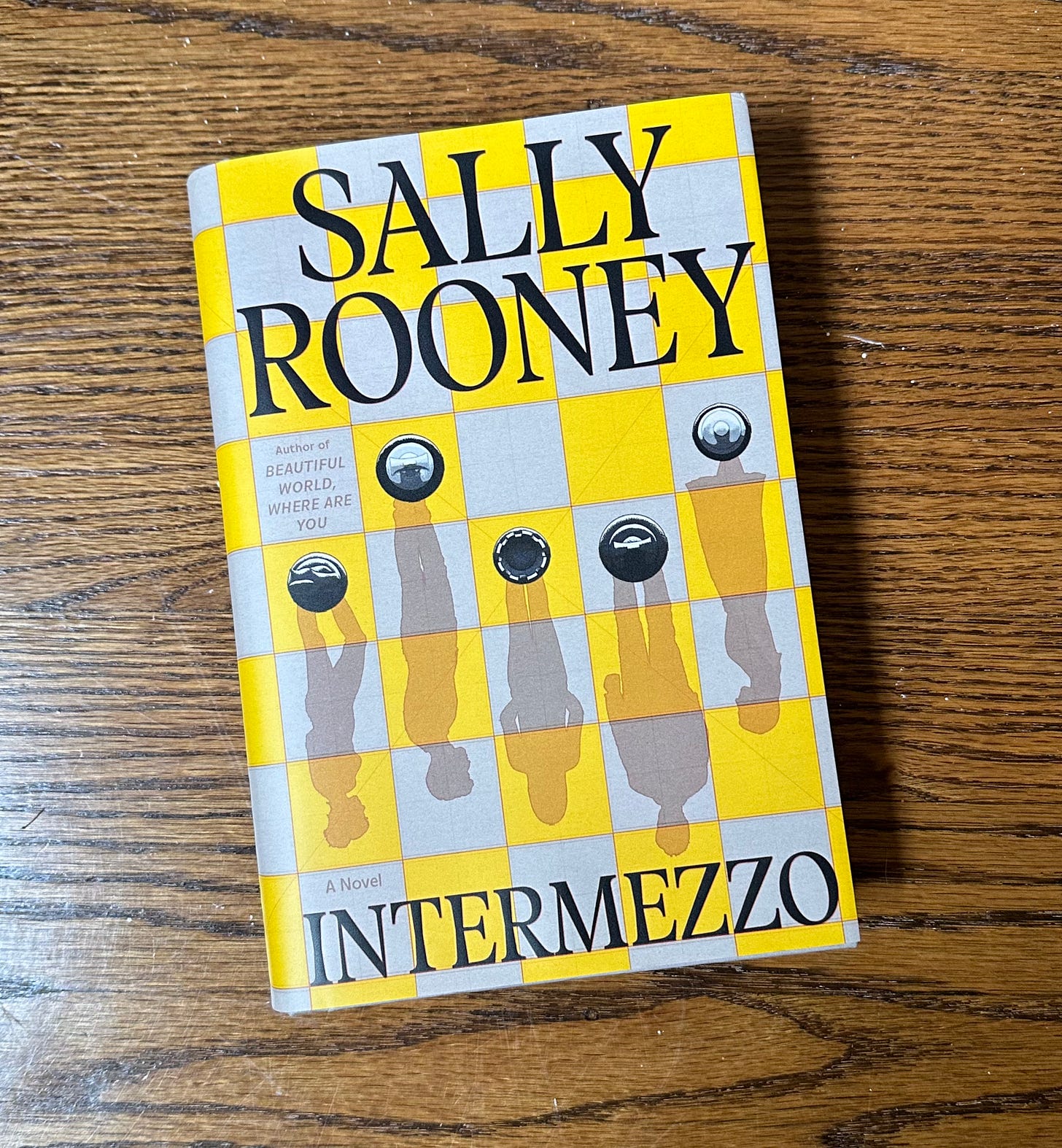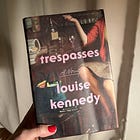BOOK JOURNAL: Intermezzo by Sally Rooney
Entry #12 on the long-awaited new Sally Rooney book, which does not disappoint in its gorgeous prose
Intermezzo by Sally Rooney
Rating: 5/5 stars
I’d like to caveat this review with a big fat disclaimer—I’m a HUGE Sally Rooney fan. Like, maybe not the level of fandom as my rabid Swiftie heart, but still a MASSIVELY LOYAL FAN. So when I tell you that it took me five weeks to read this book and I slogged through it, I want you to know that it has nothing to do with how much I ultimately loved and enjoyed this book.
In my humble opinion (well, actually!!), I don’t believe a book is “good” simply because it’s devourable, all-consuming, or easy to read. In a different headspace, I would have probably read this over a weekend—canceling plans and ordering Door Dash to support the endeavor. But, per my last email, I’ve been in a reading slump and the recent election has sent me in an emotional tail spin. My slumpy, pre- and post- election grumpy brain had other ideas on my pace through this book. Perhaps that was a good thing…
Intermezzo in many ways is exactly what you’d expect from Rooney. Gorgeous prose steeped in Irish daily life and interesting, emotionally layered characters. Her story follows two brothers who have recently lost their father. What I didn’t expect was the play with form and male (!) main characters. Rooney in her previous works used conventional prose styles, albeit expertly and deftly. In Intermezzo, however, she shifts between two primary POVs, one of which is a stream-of-consciousness style reminiscent of Virginia Woolf’s signature style (as seen in particular glory in Orlando or To the Lighthouse). Rooney is obviously playing with style to convey inner thought—and she does so in a powerful way.
Per usual, she writes Irish women beautifully, as well. Though the two main characters are men, the other POV is a woman—a love interest of one of the brothers. I found myself sitting up when the prose switched to her perspective and her story. The character sketches of the other female characters are also satisfying and layered, even if through the lens of the two main characters (i.e., through the male gaze).
This book is VERY Sally Rooney, so if you don’t enjoy her writing, you might skip this read. That being said, it’s VERY Sally Rooney, and she is really honing her craft in a clear, crips way, despite what the page count would suggest (it’s a whopping 448 pages). It’s long, but worth it—the evolution and character development is worth every word. So there’s a world where you may not have liked Beautiful World, Where Are You but love this one. BWWAY does not dive into interiority of characters in the way that Intermezzo does so satisfyingly and elegantly.
“Sense of all the windows and doors of her life flung open. Everything exposed to the light and air. Nothing protected, nothing left to be protected anymore. A wild woman, her mother called her. A shocking piece of work. And so she is. Lord have mercy.”
“Quietly they look at one another. Love at times indistinguishable from hatred.”
“Sometimes you need people to be perfect and they can’t be and you hate them forever for not being even though it isn’t their fault and it’s not yours either. You just needed something they didn’t have in them to give you.”
“Well, if that's suffering, he thinks, let me suffer. Yes. To love whoever I have left. And if ever I lose someone, let me descend into a futile and prolonged rage, yes, despair, wanting to break things, furniture, appliances, wanting to get into fights, to scream, to walk in front of a bus, yes. Let me suffer, please. To love just these few people, to know myself capable of that, I would suffer every day of my life.”
“She has been contained before, contained and directed, by the trappings of ordinary life. Now she no longer feels contained or directed by anything at all. Life has slipped free of its netting. She can do very strange things now, she can find herself a very strange person. Young men can invite her into holiday cottages for sexual reasons. It means nothing. That isn't true: it means something, but the meaning is unfamiliar.”
“But I’m very happy that I met you. And even knowing that you’re alive, I feel like my life will be a lot better. Just being able to remember – being with you, and having such a nice experience together.”
“Thinking about that day, the dog running for the tennis ball, the pasta that they ate together, the feeling wells up inside him painfully. Wanting to say and hear the words again, that can never again be said or heard. To return to the house once more, and not find it dark and empty, but airy and bright agin with open windows. To spend an afternoon together, playing with the dog, eating dinner, doing nothing, only being together, once more.”
“For a moment Margaret rests in the pleasant bony discomfort of Anna’s embrace, the scent of her house, apples, dish soap, all the fond unsuspecting loyalty of long friendship.”
The Hulu Series Normal People and Conversations with Friends based on Rooney’s books of the same titles.
For a TV show with a chess theme, The Queen’s Gambit is incredible.
Virginia Woolf’s Orlando or To the Lighthouse (as mentioned above)
Sally Rooney’s other works, Normal People and Beautiful World, Where Are You
Anything by Maggie O’Farrell. I loved After You’d Gone (her debut) and The Marriage Portrait and Hamnet have been on my TBR.
The Happy Couple by Naoise Dolan
Ghosts by Dolly Alderton
Trespasses by Louise Kennedy, as previously discussed in my Book Journal post, here:










